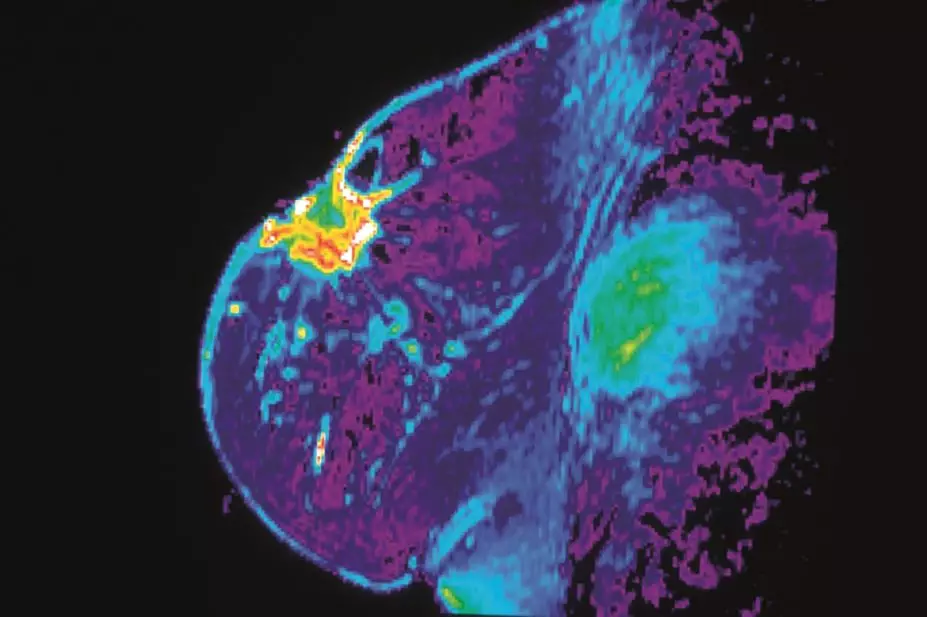
Dr. Steven Harmes, Baylor University Medical Center, Dallas Texas / Wikimedia Commons
Combining the first-in-class targeted drug palbociclib with the hormone drug fulvestrant delays the progression of advanced breast cancer by an average of nine months — twice as long as when fulvestrant was given alone — a study shows.
Researchers found that the drug combination slowed cancer growth in around two thirds of women with advanced forms of hormone-receptor-positive, HER2-negative breast cancer that had progressed on previous hormone therapy. In many cases, the combination delayed the need to start chemotherapy — the usual treatment option once hormone drugs have stopped working.
“Our research underlines the effectiveness of palbociclib with fulvestrant in metastatic breast cancer and, importantly, demonstrates its benefit in all types of hormone-receptor positive breast cancer,” says lead author Nicolas Turner, team leader in molecular oncology at The Institute of Cancer Research in London and consultant medical oncologist at The Royal Marsden NHS Foundation Trust.
“We hope our results lead to the adoption of this drug combination in breast cancer, where it delays the need to start chemotherapy by an average of nine months,” he adds.
The study, a phase III clinical trial funded by Pfizer and published in The Lancet
[1]
(online, 2 March 2016), was carried out in 17 countries and involved 521 women aged 18 years or over with advanced forms of hormone-receptor-positive, HER2-negative breast cancer. Some 347 of the women received palbociclib plus fulvestrant, while 174 of the women received placebo plus fulvestrant. Palbociclib blocks two proteins called CDK4 and CDK6 in cancer cells.
After a median follow-up of 8.9 months, progression-free survival assessed by CT and MRI scans was 9.5 months (95% CI 9.2–11.0) in the fulvestrant plus palbociclib group and 4.6 months (3.5–5.6) in the fulvestrant plus placebo group (hazard ratio 0.46, 95% CI 0.36–0.59, P<0·0001).
Some 67% of the 347 women in the palbociclib plus fulvestrant group showed clinical benefit – either a reduction in tumour size or control of disease for at least six months — compared with 40% of the 174 women in the placebo plus fulvestrant group. A decrease in tumour size was seen in 19% of women who took palbociclib plus fulvestrant group compared with 9% of those in the fulvestrant plus placebo group.
Most women on palbociclib (81%) experienced neutropenia, meaning they have a low level of neutrophils, leading to a higher risk of developing serious infection, but this rarely led to serious symptoms. This compares with just 3% in the placebo arm.
Richard Berks, senior research communications officer at Breast Cancer Now, comments: “While severe symptoms were rare, the high number of patients experiencing side effects is of some concern, and underlines the need to provide additional support to patients to maintain their quality of life during treatment.”
Turner adds: “Our study also sends a powerful message that in combining new drugs in innovative trials we can find better options for women with advanced breast cancer. Chemotherapy can add several months to life but it comes at a cost of often life-limiting side effects, and we need alternative treatments that are better tolerated to treat patients with advanced breast cancer.”
Samia al Qadhi, chief executive at Breast Cancer Care, says: “This treatment option could be a real game changer. We now need to know whether it will be used in clinical practice, and if it will be made available to those who desperately need it through the NHS.”
Paul Workman, chief executive of The Institute of Cancer Research, London, says: “If we’re going to drive further improvements in survival from cancer, it’s essential that we find ways of prolonging life in people whose cancers have evolved and become resistant to treatment.”
He adds: “This trial is an exciting example of one of the most promising approaches to overcoming drug resistance, by combining drugs with different mechanisms of action to block off cancer’s escape routes. It’s very encouraging to see such substantial delays to cancer progression.”
A spokesperson for the European Medicine Agency (EMA) adds that a marketing authorisation application for palbociclib is under evaluation by the EMA Committee for Medicinal Products for Human Use (CHMP). The combination of palbociclib plus fulvestrant was approved for use in breast cancer by the US Food and Drug Administration in February 2016.
References
[1] Cristofanilli M, Turner NC, Bondarenko I, et al. Fulvestrant plus palbociclib versus fulvestrant plus placebo for treatment of hormone-receptor-positive, HER2-negative metastatic breast cancer that progressed on previous endocrine therapy (PALOMA-3): final analysis of the multicentre, double-blind, phase 3 randomised controlled trial. Lancet Oncology 2016. doi: 10.1016/S1470-2045(15)00613-0


